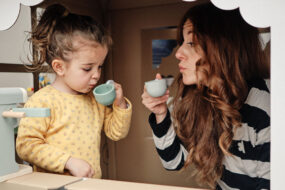The rise of kids’ bedtime anxiety (and what to do about it)
Bedtime battles aren’t always just a matter of your child not wanting to go to sleep… it may be a red flag that something else is up.
Kids and sleep often don’t go hand in hand, with new research showing that 86 per cent of Australian children suffer from bedtime anxiety and sleep issues.
Families are losing out on up to five hours of sleep a night, impacting productivity, mood and feelings of wellbeing, according to a survey by Signify.
It found 62 per cent of parents suffer from broken and poor sleep patterns because of their child’s bedtime anxiety.
- Young minds: Why are kids getting so anxious?
Common causes of bedtime anxiety include:
- Excessive energy
- Overactive imaginations
- Fear of the dark
- General anxiety
- Excessive screen time
Half of the parents surveyed admitted to letting their children sleep next to them to help them sleep.
Clinical psychologist and behavioural expert Jaimie Bloch says small changes can make a big difference in alleviating children’s bedtime battles.
Here are Dr Bloch’s top tips for improving children’s bedtime routines:
Dim the lights
“(Poor lighting) is detrimental to our bedtime routine, stress levels, even our ability to unwind, and is often one of the last things parents think to change to improve their child’s bedtime ritual,” Dr Bloch, of Mind Movers and Psychology, says.
A 2014 study found being surrounded by bright light in the few hours before bedtime can affect our circadian rhythm, with researchers recommending that people reduce their evening light exposure.
“Light filtering into our eyes is what helps set off specific chemicals in our bodies that trigger the sleep/wake cycle, and can be negatively affected by harsh lighting,” says Dr Bloch.
“Gentle lighting is easy on the eyes and a simple change that parents can make in the home to facilitate healthy sleep patterns.”
Create a bedtime routine
“This will allow your child to develop the optimum circadian rhythm. Children can become anxious when falling asleep becomes difficult,” Dr Bloch says.
“Having a routine allows your child the comfort of knowing and learning when it’s time to start getting the body and mind into sleep mode.”
Step outside
“The sun allows our bodies to experience a natural chemical release which promotes good sleep,” she says.
“Because we are active in the day and sleep at night our circadian rhythm is set and triggered by sunrise and sunset.”
Set tech-free zones and screen limits
“The bedroom should be associated only with sleep. Having a zone free of tech, entertainment and homework allows the bedroom to become a place of rest and relaxation,” Dr Bloch says.
“Put limits around screen time at night-time. The recommendation is children should not be using screens 60 to 90 minutes prior to bedtime.”
- Switch off: The dark side of blue light
Keep things comfy
“A relaxing environment can help to relax the child and a child’s ability to naturally produce melatonin, which will improve the quality and length of sleep,” Dr Bloch says.
- Dream life: What happened when I started prioritising sleep
Written by Sally Heppleston.





